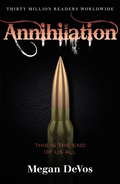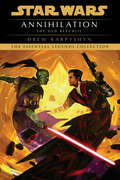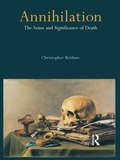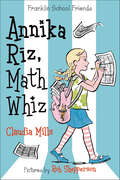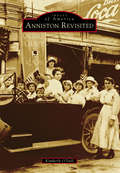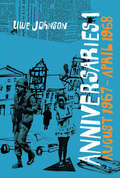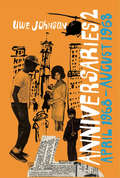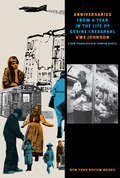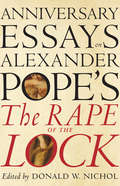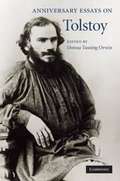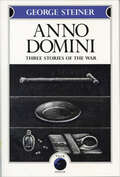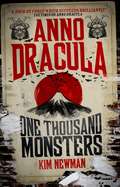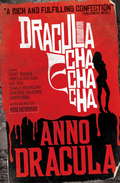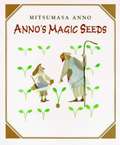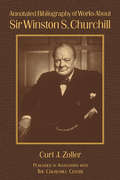- Table View
- List View
Annihilation: Book 4 in the Anarchy series (Anarchy Ser.)
by Megan DeVosTHIRTY MILLION READERS WORLDWIDE. INCLUDES EXCLUSIVE NEVER BEFORE SEEN CHAPTER.'The Hunger Games meets The Road' MTVThis is the end of us all.For Hayden and Grace, the threat of war has become a reality. The world is running out of resources, driving the survivors to drastic, inhuman measures. Blackwing is the obvious target and physical attacks from enemies are accompanied by the devastating mental turmoil that cannot be fought off with weapons.This is life impacted by war with enemies, allies and oneself. Now, not much is certain, but a few things are guaranteed:There will be pain. There will be death. There will be annihilation.
Annihilation: Book 4 in the Anarchy series (Anarchy)
by Megan DeVosTHIRTY MILLION READERS WORLDWIDE. INCLUDES EXCLUSIVE NEVER BEFORE SEEN CHAPTER.'The Hunger Games meets The Road' MTVThis is the end of us all.For Hayden and Grace, the threat of war has become a reality. The world is running out of resources, driving the survivors to drastic, inhuman measures. Blackwing is the obvious target and physical attacks from enemies are accompanied by the devastating mental turmoil that cannot be fought off with weapons.This is life impacted by war with enemies, allies and oneself. Now, not much is certain, but a few things are guaranteed:There will be pain. There will be death. There will be annihilation.
Annihilation: Book 4 in the Anarchy series (Anarchy)
by Megan DeVosTHIRTY MILLION READERS WORLDWIDE. INCLUDES EXCLUSIVE NEVER BEFORE SEEN CHAPTER.'The Hunger Games meets The Road' MTVThis is the end of us all.For Hayden and Grace, the threat of war has become a reality. The world is running out of resources, driving the survivors to drastic, inhuman measures. Blackwing is the obvious target and physical attacks from enemies are accompanied by the devastating mental turmoil that cannot be fought off with weapons.This is life impacted by war with enemies, allies and oneself. Now, not much is certain, but a few things are guaranteed:There will be pain. There will be death. There will be annihilation.
Annihilation: Star Wars (The Old Republic) (Star Wars: The Old Republic - Legends #4)
by Drew KarpyshynNEW YORK TIMES BESTSELLER • Join Republic spy Theron Shan as he faces off against the Sith Empire itself in this epic installment of The Old Republic.Light side, dark side—these are just empty words. . . . There are only two sides I care about: us and them. Republic or Empire! The Sith Empire is in flux. The Emperor is missing, presumed dead, and an ambitious Sith lord&’s attempt to seize the throne has ended fatally. Still, Darth Karrid, commander of the fearsome Imperial battle cruiser Ascendant Spear, continues her relentless efforts to achieve total Sith domination of the galaxy. But Karrid&’s ruthless determination is more than matched by the steely resolve of Theron Shan, whose unfinished business with the Empire could change the course of the war for good. Though the son of a Jedi master, Theron does not wield the Force—but, like his renowned mother, he has the spirit of rebellion in his blood. As a top covert agent for the Republic, he struck a crucial blow against the Empire by exposing and destroying a Sith superweapon arsenal—which makes him the ideal operative for a daring and dangerous mission to end Ascendant Spear&’s reign of terror. Joined by hot-headed smuggler Teff&’ith, with whom he has an inexplicable bond, and wise Jedi warrior Gnost-Dural, Darth Karrid&’s former master, Theron must match wits and weapons with a battle-tested crew of the most cold-blooded disciples of the Dark Side. But time is running brutally short. And if they don&’t seize their one chance to succeed, they will surely have countless opportunities to die.
Annihilation: The Sense and Significance of Death
by Christopher BelshawThe ever-present possibility of death forces upon us the question of life's meaning and for this reason death has been a central concern of philosophers throughout history. From Socrates to Heidegger, philosophers have grappled with the nature and significance of death. In "Annihilation", Christopher Belshaw explores two central questions at the heart of philosophy's engagement with death: what is death; and is it bad that we die? Belshaw begins by distinguishing between literal and metaphorical uses of the term and offers a unified and biological account of death, denying that death brings about non-existence. How our death relates to the death of the brain is explored in detail. Belshaw considers the common-sense view that death is often bad for us by examining the circumstances that might make it bad as well as the grounds for thinking that one death can be worse than another. In addition, Belshaw explores whether we can be harmed after we die and before we were born. The final chapters explore whether we should prevent more deaths and whether, via cryonics, brain transplants, data storage, we might cheat death. Throughout Belshaw shows how questions of personhood and life's value are bound up with our views on the sense and significance of death. "Annihilation's" in-depth analysis and insightful exposition will be welcomed not only by philosophers working on the metaphysics of death but also by students and scholars alike looking for a foundation for discussions of the ethics of abortion, euthanasia, life-support and suicide.
Annika Riz, Math Whiz (Franklin School Friends #2)
by Claudia MillsAnnika Riz loves math more than anything, so when she hears about a sudoku contest at the local public library, she is determined to win it—maybe then her friends Kelsey Green and Izzy Barr will see that math is just as cool as reading and running. When the school carnival, the biggest fundraiser of the year, comes around, Annika realizes her class booth is losing money by selling their lemonade too cheaply. Annika embraces her math skills, saves the day, and shows her friends that math can be useful and even a bit of fun, too, in Claudia Mills's Annika Riz, Math Whiz.
Annika Sorenstam
by Jeff SavageAnnika Sorenstam is the best professional female golfer in the world and has made history as the first woman in more than 50 years to compete in a men's Professional Golfer's Association (PGA) Tour event. She has now become an international celebrity and is so popular in her native country, Sweden, that her picture was put on a postage stamp.
Anniston Revisited
by Kimberly O’dellNestled in the Piedmont region of the Appalachian Mountains, the small farming community of Pine Ankle was established in the 1830s on the former lands of the Creek Nation. In 1872, industrialists Samuel Noble and Daniel Tyler purchased the land for their Woodstock Iron Company, and in 1883 the town was opened to the public as Annie's Town. It grew rapidly, and by the early 20th century Anniston was not only the seat of Calhoun County, but also home to numerous textile and iron industries as well as a thriving military complex. The vintage photographs in Images of America: Anniston Revisited showcase the daily lives of Annistonians and Fort McClellan soldiers during a time when Noble Street was a bustling urban center. Anniston's homes, schools, and community centers are featured, along with the expanded downtown area and Fort McClellan, to paint a vivid portrait of "The Model City."
Anniversaries, Volume 1: From a Year in the Life of Gesine Cresspahl, August 1967–April 1968
by Uwe JohnsonThe first volume of a titanic masterpiece of twentieth-century literature, named one of the best books of 2019 by The New York Times critics.Published to great acclaim as a two-part boxed set in 2019, Anniversaries will now be available as two individual volumes. It is August 1967, and Gesine Cresspahl, born in Germany the year that Hitler came to power, a survivor of war, of Soviet occupation, and of East German Communism, has been living with her ten-year-old daughter, Marie, in New York City for six years. Mother and daughter find themselves caught up in the countless stories of the world around them: stories of work and school and their neighborhood, with its shifting and varied cast of characters, as well as the stories that Gesine reads in The New York Times every day—about Che Guevara, racial violence, the war in Vietnam, and the US elections to come. Now, with Marie growing up, Gesine has decided to tell her daughter the story of her own childhood in a small north German town in the 1930s and &’40s. Amid memories of Germany&’s criminal and disastrous past and the daily barrage of news from a world in disarray, Gesine, conscientious, self-scrutinizing, with a sharp sense of humor, struggles to describe what she has learned over the years and what she hopes to pass on to Marie. Marie, articulate, quizzical, with a perspective that is very much her own, has plenty of questions, too.Uwe Johnson&’s intimate portrait of a mother and daughter is also a panorama of past and present history and the world at large. Comparable in richness of invention and depth of feeling to Joyce&’s Ulysses and Proust&’s In Search of Lost Time, Anniversaries is one of the world&’s great novels.
Anniversaries, Volume 2: From a Year in the Life of Gesine Cresspahl, April 1968–August 1968
by Uwe JohnsonThe second volume of a titanic masterpiece of twentieth-century literature, named one of the best books of 2019 by The New York Times critics.Anniversaries, Volume 2 begins on April 20, 1968. Before long Marie will be devastated by the assassination of Robert F. Kennedy, even as the news of the Prague Spring has awakened Gesine&’s long-dashed hopes that socialism could be a humanism. Meanwhile, her boss at the bank has his own ideas about Czechoslovakia, and Gesine faces the prospect of having to move there for work. Continuing the story of her past from Anniversaries, Volume 1, Gesine describes the Soviet occupation of her hometown, Jerichow, where her father was installed as mayor and ended up in a brutal prison camp. Gesine herself charts a rebellious course through school, ever more bitterly conscious of the moral ugliness of life behind the Iron Curtain. As the year of the novel comes to its end, past and present converge and the novel circles back to its beginnings: Gesine tells Marie about her father, Jakob, dead before she was born, about leaving East Germany, and, as history threatens to take them away from New York, about the beginning of their life together in the city that they have both come to love.
Anniversaries: From a Year in the Life of Gesine Cresspahl
by Damion Searls Uwe JohnsonA landmark of 20th Century literature about New York in the late 1960s, now in English for the first time.Late in 1967, Uwe Johnson set out to write a book that would take the unusual form of a chapter for every day of the ongoing year. It would be the tale of Gesine Cresspahl, a thirty-four-year-old single mother who is a German émigré to Manhattan’s Upper West Side, and of her ten-year-old daughter, Marie—a story of work and school, of friends and lovers and the countless small encounters with neighbors and strangers that make up big-city life. An everyday tale, but also a tale of the events of the day, as gleaned by Gesine from The New York Times: Johnson could hardly foresee the convulsions of 1968, but some of the news—the racial unrest roiling America, the escalating war in Vietnam—was sure to be news for some time yet to come. Finally, it would be a tale told by Gesine to Marie about Gesine’s childhood in a small north German town, of her independent and enterprising father, of her troubled mother, of Nazi Germany (Gesine was born the year Hitler came to power) and World War II and Soviet retribution and the grimly regulated realities of Communist East Germany. An ambitious historical novel as well as a wonderfully observed New York novel, Anniversaries would take in the unsettled world of the present along with the twentieth century’s disastrous past, while vividly depicting the struggle of a loving, though hardly uncomplicated mother and a bright, indomitably curious girl to understand and care for each other and to shape a human world.Gesine and Marie are among the most memorable and engaging characters in literature, and Anniversaries, at once monumental and intimate, sweeping and full of incident, stylistically adventurous and endlessly absorbing, is quite simply one of the great books of our time.
Anniversary Essays on Alexander Pope's 'The Rape of the Lock'
by Don NicholAlexander Pope's heroi-comical, mock-epic poem, The Rape of the Lock, continues to sparkle after three hundred years as a peerless gem in the canon of English literature. In celebration of its tercentenary, this collection brings together ten eminent scholars with new perspectives on the poem. Their approaches reflect the vast range of interpretation of Pope's text, from discussions of religion, gender, and eighteenth-century biological science to an interview with Sophie Gee about her novelization of the poem in The Scandal of the Season. These stimulating analyses will be essential reading for students and teachers of The Rape of the Lock and a valuable resource for investigating eighteenth-century culture.
Anniversary Essays on Tolstoy
by Donna Tussing OrwinA century after Leo Tolstoy's death, the author of War and Peace is widely admired but too often thought of only with reference to his realism and moral sense. The many sides of Tolstoy revealed in these new essays speak to today's readers with astonishing force, relevance, and complexity. In a lively, challenging style, leading scholars range over his long life, from his first work Childhood to the works of his old age like Hadji Murat, and the many genres in which he worked, from the major novels to aphorisms and short stories. The essays present new approaches to his central themes: love, death, religious faith and doubt, violence, the animal kingdom, and war. They also assess his reception both in his lifetime and subsequently. Setting new agendas for the study of this classic author, this volume provides a snapshot of current scholarship on Tolstoy.
Anno Domini: Three Stories of the War
by George SteinerFrom a PEN/Faulkner award–winning author and acclaimed literary critic, three novellas exploring the psychological impact of WWII on its survivors. A German soldier returns to a French village hoping to assuage his guilt for atrocities committed there. A young American joins the French resistance. The relationship between friends is forever transformed by their wartime experiences. The three stories bundled in Anno Domini are tales about war and love, and the enduring impact of traumatic memories on the human spirit.
Anno Dracula
by Kim NewmanIt is 1888 and Queen Victoria has remarried, taking as her new consort Vlad Tepes, the Wallachian Prince infamously known as Count Dracula. Peppered with familiar characters from Victorian history and fiction, the novel follows vampire Geneviève Dieudonné and Charles Beauregard of the Diogenes Club as they strive to solve the mystery of the Ripper murders. Anno Dracula is a rich and panoramic tale, combining horror, politics, mystery and romance to create a unique and compelling alternate history. Acclaimed novelist Kim Newman explores the darkest depths of a reinvented Victorian London. This brand-new edition of the bestselling novel contains unique bonus material, including a new afterword from Kim Newman, annotations, articles and alternate endings to the original novel.
Anno Dracula - One Thousand Monsters
by Kim Newman“There are no vampires in Japan. That is the position of the Emperor. The Emperor is wrong...”In 1899 Geneviève Dieudonné travels to Japan with a group of vampires exiled from Great Britain by Prince Dracula. They are allowed to settle in Yōkai Town, the district of Tokyo set aside for Japan’s own vampires, an altogether strange and less human breed than the nosferatu of Europe. Yet it is not the sanctuary they had hoped for, as a vicious murderer sets vampire against vampire, and Yōkai Town is revealed to be more a prison than a refuge. Geneviève and her undead comrades will be forced to face new enemies and the horrors hidden within the Temple of One Thousand Monsters…
Anno Dracula 1899 and Other Stories
by Kim NewmanA brand new collection of chilling stories by master of horror Kim Newman, in which Jack the Ripper still stalks the streets, Frankenstein's monster rises from the Arctic ice, and the terrifying legacy of Dr Jeyll and Mr Hyde haunts fog-shrouded London. This volume also includes a brand-new, exclusive Anno Dracula story, 'Yokai Town: Anno Dracula 1899', which sets the scene for the forthcoming novel Anno Dracula 1999: Daikaiju.
Anno Dracula 1999: Daikaiju
by Kim NewmanThe new novel in the acclaimed alternate history vampire series from Kim Newman."Compulsory reading... glorious" Neil Gaiman on Anno DraculaIt is the eve of the new millennium, and the vampire princess Christina Light is throwing a party in Daikaiju Plaza - a building in the shape of a giant mechanical dragon - in Tokyo, attended by the leaders of the worlds of technology, finance, culture and innovation.After a century overshadowed by the malign presence of Dracula, Christina decrees the inauguration of an Age of Light. The world is connected as never before by technology, and conquests have been made in cyberspace that mark out new nations of the living and the undead.But the party is crashed by less enlightened souls, intent on ensuring that the brave new world dies before it can come to fruition. The distinguished guests are held hostage by cyberpunk terrorists, yakuza assassins and Transylvanian mercenaries. Vampire schoolgirl Nezumi - sword-wielding agent of the Diogenes Club - finds herself alone, pitted against the world's deadliest creatures. Thrown out of the party, she must fight her way back up through a building that seems designed to destroy her in a thousand ways. Can Nezumi survive past midnight? Can the hopes of a shining world?
Anno Dracula: Dracula Cha Cha Cha
by Kim NewmanWritten by award-winning novelist Kim Newman, this is a brand-new edition, with additional 40,000 word never-before-seen novella, of the popular third installment of the Anno Dracula series, Dracula Cha Cha Cha.Rome. 1959. Count Dracula is about to marry the Moldavian Princess Asa Vajda - his sixth wife. Journalist Kate Reed flies into the city to visit the ailing Charles Beauregard and his vampire companion Geneviève. Finding herself caught up in the mystery of the Crimson Executioner who is bloodily dispatching vampire elders in the city, Kate discovers that she is not the only one on his trail...
Anno Dracula: Johnny Alucard
by Kim NewmanTHE HOTLY ANTICIPATED BRAND-NEW ADDITION TO THE CRITICALLY ACCLAIMED ANNO DRACULA SERIES!Award-winning author Kim Newman takes the series stateside to Andy Warhol's New York and Orson Welles' Hollywood.It's 1976 and vampire reporter Kate Reed is on the set of Francis Ford Coppola's Dracula. She helps a young vampire boy, Ion Popescu, who then leaves Transylvania for America. In the States, Popescu becomes Johnny Pop and attaches himself to Andy Warhol, inventing a new drug which confers vampire powers on its users...
Anno Dracula: The Bloody Red Baron (Anno Dracula)
by Kim NewmanPraise for Anno Dracula:"Kim Newman's Anno Dracula is back in print, and we must celebrate. It was the first mash-up of literature, history and vampires, and now, in a world in which vampires are everywhere, it's still the best, and its bite is just as sharp. Compulsory reading, commentary, and mindgame: glorious." - Neil Gaiman"Politics, horror, and romance are woven together in this brilliantly imagined and realized novel. Newman's prose is a delight, his attention to detail is spellbinding." - Time Out"Stephen King assumes we hate vampires; Anne Rice makes it safe to love them, because they hate themselves. Kim Newman suspects that most of us live with them... Anno Dracula is the definitive account of that post-modern species, the self-obsessed undead." - New York Times"Anno Dracula will leave you breathless... one of the most creative novels of the year." - Seattle Times"Powerful... compelling entertainment... a fiendishly clever banquet of dark treats." - San Francisco Chronicle'A ripping yarn, an adventure romp of the best blood, and a satisfying... read' - Washington Post Book World"The most comprehensive, brilliant, dazzlingly audacious vampire novel to date. 'Ultimate' seems an apt description... Anno Dracula is at once playful, horrific, intelligent, and revelatory." - Locus "A marvelous marriage of political satire, melodramatic intrigue, gothic horror, and alternative history. Not to be missed." - The Independent "Once you start reading this Victorian-era thriller, you will not be satiated until you reach the end." - Ain't It Cool"Anno Dracula is the smart, hip Year Zero of the vampire genre's ongoing revolution." - Paul McAuley"Kim Newman brings Dracula back home in the granddaddy of all vampire adventures. Anno Dracula couldn't be more fun if Bram Stoker had scripted it for Hammer. It's a beautifully constructed Gothic epic that knocks almost every other vampire novel out for the count." - Christopher Fowler "The most interesting take on the Dracula story... to date. Recommending this one to all those that love Dracula and historical fiction!" - RexRobotReviews --WAR IS HELL...It is 1918 and Graf von Dracula is commander-in-chief of the armies ofGermany and Austria-Hungary. The War of the Great Powers in Europeis also a war between the living and the undead. Caught up in the conflict, Charles Beauregard, an old enemy of Dracula, his protegé Edwin Winthrop,and intrepid vampire reporter Kate Reed go head-to-head with the lethal vampire flying machine that is the Bloody Red Baron... In the brand-new novella Vampire Romance, Geneviève Dieudonné,newly returned to England, infiltrates a singular vampire gathering in the service of the Diogenes Club.A brand-new edition, with additional novella, of the critically acclaimed, bestselling sequel to Anno Dracula. Written by popular novelist and movie critic Kim Newman, The Bloody Red Barontakes the story into the 20th century.
Anno's Counting Book
by Mitsumasa AnnoFirst there is an empty field. The it is January, the first month of the year. All alone in the snow stands 1 yellow house. In front, 1 child builds a snowman. Behind the house is 1 tree and 1 black cow. Now, five months later, it is June. There are 6 buildings in the field, 6 children playing, and 6 adults working. One adult tends 6 ducks. Another drives a trains with 6 cars. From 1 to 12, through the months of the year, the town grows. More houses and trees and animals and people can be seen until December arrives with all it's magic.
Anno's Magic Seeds
by Mitsumasa AnnoThe reader is asked to perform a series of arithmetic operations integrated into the story of a man who plants magic seeds and reaps an increasingly abundant harvest. A story that helps children understand the process of plant growth.
Annotated Bibliography of Works About Sir Winston S. Churchill
by Richard M. Langworth Curt ZollerThis unique resource will be an enormous aid and impetus to Churchill studies. It lists over 600 works, with annotations, and includes sections listing an additional 5,900 entries covering book reviews, significant articles, and chapters from books. Separate author and title indexes will allow the user to locate specific entries. The book's aim is to direct students, researchers, and bibliophiles to the entire corpus of works about Churchill.
